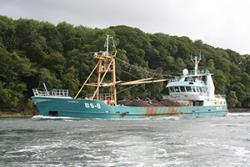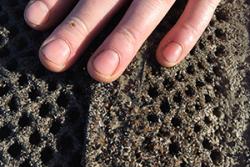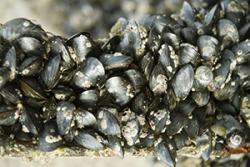Sourcing sustainable Irish Sea mussels
 One of the Bangor Mussels Producers’ Association fleet of mussel boats comes up the Menai Strait.: Image supplied by Bangor Mussels Producers’ Association LimitedWhen the UK’s largest exporting mussel fleet heads out to sea later this month, it will be in search of valuable seed mussels that they will then bring back to the Menai Strait to grow on before collection for export.
One of the Bangor Mussels Producers’ Association fleet of mussel boats comes up the Menai Strait.: Image supplied by Bangor Mussels Producers’ Association LimitedWhen the UK’s largest exporting mussel fleet heads out to sea later this month, it will be in search of valuable seed mussels that they will then bring back to the Menai Strait to grow on before collection for export.
If a new Irish Sea research project is successful, this may be one of the last times the fleet need to set out from Bangor’s Port Penrhyn to search for seed mussels.
The recent award of an EUR 1M to the ‘Irish Sea Portal Pilot’ research grant through the EU’s Ireland-Wales Cooperation programme, should provide both fishermen and scientists with a better understanding of how shellfish larvae travel around the Irish Sea, and when and where they can be found.
This research, which would increase the fleet’s efficiency, could also lead to the development of new UK market for the mussels. This could provide a sustainable food source for the UK supermarket and the local food supply chain. Looking to the future, the company say that this could be the catalyst for the development of a local mussel producing centre which would make this excellent product available locally and meet a growing demand for local sourcing policies by the retail and hospitality industries.
For the Bangor Mussels Producers’ Association Limited, a group which includes Bangor’s three mussel companies, the project is the latest in a longstanding research partnership with Bangor University’s School of Ocean Sciences. Joint research has provided the mussel producers with the detailed scientific and environmental evidence base to support their industry, assisting the producers to achieve the vital Marine Stewardship Council certification for the sustainability of their activities.
The project to investigate patterns of movement of shellfish larvae in the Irish Sea should help reduce the costs of locating shellfish seed which is collected and ‘re-sown’ on mudflats, and increase the volume of mussels and shellfish available to the industry.
 Young 'seed' mussels: Image from Bangor Mussels Producers’ Association LimitedSpeaking on behalf of the group, Trevor Jones said:
Young 'seed' mussels: Image from Bangor Mussels Producers’ Association LimitedSpeaking on behalf of the group, Trevor Jones said:
“We have a valuable, nutritious, sustainable product.
“We currently spend a great deal of time sourcing wild mussel seed to grow on, so that we can harvest them. A better understanding of when and where the seed mussel was to be found, would increase our efficiency and sustainability.”
“Working with experts at the University and sharing best practices from Ireland will assist us to have the greatest benefit from the valuable sustainable resources that we share”
Dr Shelagh Malham, who leads the research from the University’s School of Ocean Sciences said: “Working with our Irish counterparts gives us the opportunity to manage common valuable resources between our shores, and to improve our understanding of the processes involved.”
“When the mussels spawn, the larvae travel with the currents. Where they settle depends on the tide and the weather conditions at any given time,” she added.
Dr Peter Robins, a research fellow at the School of Ocean Sciences explained:
 “Using supercomputers, complex models can simulate ocean circulation patterns and map where larvae spawnings will drift in the Irish Sea, according to the seasonal conditions, and share this information so that the mussel men know where and when to find these ‘seed mussels’. Feedbacks between the model outputs and fishermen’s local knowledge will give us insights as to how the larvae swim, using the currents to maximise their survival potential. We will also be investigating how well the mussels attach themselves and grow on different seabed and other surfaces.”
“Using supercomputers, complex models can simulate ocean circulation patterns and map where larvae spawnings will drift in the Irish Sea, according to the seasonal conditions, and share this information so that the mussel men know where and when to find these ‘seed mussels’. Feedbacks between the model outputs and fishermen’s local knowledge will give us insights as to how the larvae swim, using the currents to maximise their survival potential. We will also be investigating how well the mussels attach themselves and grow on different seabed and other surfaces.”
Publication date: 17 March 2017
